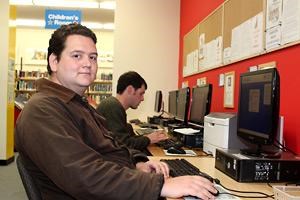Canada’s government has announced it is cutting funding for a public Internet access program.
The Community Access Program (CAP) operates out of libraries and community centres across Canada to provide Internet access to the public.
Bev Collins is executive director of the Pacific Community Networks Association (PCNA), an organization that provides technical services to CAP sites and their clients in BC. Collins, who runs the program from Powell River, found out about the funding cut 25 minutes before the end of the day on Thursday, April 5, the day before the start of the long Easter weekend.
Collins said she was surprised at the suddenness of the announcement. “We’ve been preparing for the program to sunset for years,” she said. “But we also thought when it finally ended, they’d give us a transition year, to say prepare your sites, fade it out, let them make changes.”
A letter from Industry Canada stated CAP has “successfully achieved its objectives,” but Collins said people involved with the project don’t agree with that.
While the funding for CAP sites is being cut, the government is continuing with the CAP youth initiative, which provides funds to hire people from 15 to 30 years old. Collins said CAP youth can only be placed at CAP sites. “If 50 per cent of the CAP sites can’t operate, will they have the capacity to supervise and hire a youth?”
PCNA delivers the CAP youth program in BC, Collins said, and there are 100 students employed around the province. “There are already capacity issues at the sites, being able to supervise, manage and do payroll,” she said. “Now if you take away the supervisors or expect the youth to do even more, there are going to be issues.”
Each site receives $3,700 a year, Collins said, which is “nothing in comparison to what it costs to actually manage a site.”
There are six sites in the Powell River area at the following locations: Powell River Chamber of Commerce; Powell River Public Library; Vancouver Island University Library; Family Place; Community Resource Centre; and Texada Island branch of the library.
Danny McKenzie, PCNA’s provincial youth coordinator and technical manager, said while the hope is the locations in Powell River will be able to keep the sites open, in more remote areas of the province, sites are located in buildings where the $3,700 was being used for Internet access and, in some places, it is the only Internet access available.
In Powell River, a lot of the users are people who either don’t have a computer at home or whose computers are broken and they can’t afford to get them fixed, McKenzie said.
Powell River Employment Program (PREP) runs two of the sites in Powell River, at Family Place and the Community Resource Centre. Margaret Leitner, executive administrator, said while the program isn’t a lot of money, it has a big impact on the community and the loss of it will be felt. “We will not be able to afford to keep the maintenance of the machines and provide the staff time to help people who need help using the computers,” she said.
There are six computers at the resource centre and one at Family Place, which are used a lot, Leitner said. “We’re anticipating an impact,” she said. “We don’t know exactly what that will be at this point and how we might cope with it in the end. We still have to figure that out.”
Kim Miller, chamber manager, said the chamber office has two computers which are hooked up to printers and scanners that are set up through the CAP program. She said the chamber will be able to keep the computers available to the public and it will continue to hire a student under the youth program. “It’s amazing the host of services that a CAP intern can provide to the public,” she said.
Charlie Kregel, chief librarian, said no Internet access at the library will be cut. “However, it is disappointing that the funding is gone,” he said. “The service it provided was really important. Every time we get another little cut, it hurts a little more.”
Interested readers can find out more about the issue online.



